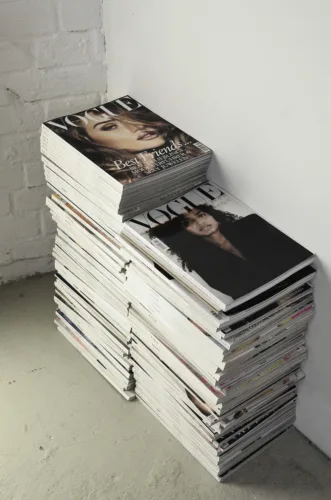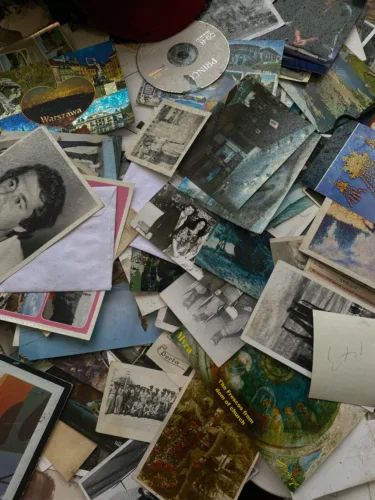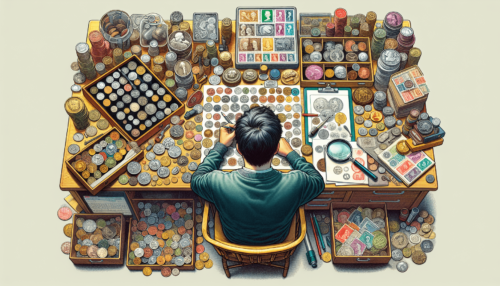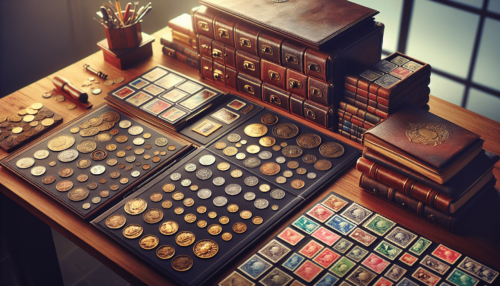“Discovering the Benefits of Collecting as a Hobby” drives a fascinating exploration into the multifaceted advantages gleaned from the pursuit of collecting, a hobby practiced by various enthusiasts globally. It highlights not only the emotional and intellectual rewards but also navigates through its historical context, current trends, and the overall influence on society. The discussion molds an immersive narrative by presenting case studies, contrasting perspectives, and meticulous exploration of key concepts, making it a captivating read to those interested in the subject. Lastly, it gazes to the horizon by projecting future implications and potential developments in the realm of collecting as a hobby.
Table of Contents
Discovering the Benefits of Collecting as a Hobby
Understanding the Hobby of Collecting
Defining the hobby of collecting
Collecting can be defined as the systematic acquisition and conservation of particular types of objects or experiences that bring satisfaction or pleasure to the collector. It is not merely about accumulating objects; it is a process driven by the fascination and passion towards these items. The objects of collection can vary immensely as every collector has a unique perspective and interest.
Diverse forms of collecting
There are countless types of collectibles that people take interest in, from vintage books, coins, stamps, to more modern day collectibles like comic books, action figures, and even digital assets like cryptocurrency. However, the essence of collecting lies not merely in the object themselves, but rather in the joy of the hunt, the satisfaction of categorizing, and the emotional value associated with the items.
Psychological Benefits of Collecting
Improvement in cognitive functions
Collecting as a hobby can significantly improve cognitive functions. The brain is consistently engaged in activities such as sorting, categorizing, researching, and negotiating. These cognitive operations promote memory retention, critical thinking, and problem-solving skills.
Anxiety and stress relief
Collecting can provide a much-needed distraction from daily stressors, allowing one to plunge into a meditative zone where they can focus entirely on their collection. It provides a therapeutic outlet to reduce anxiety, serving as a positive coping strategy.
Sense of accomplishment and fulfillment
Completing a collection or finding a rare item can instil a strong sense of accomplishment, boosting self-esteem and self-worth. Collecting allows one to set goals and meet them, bringing a sense of fulfillment that might not be obtained elsewhere.

This image is property of images.pexels.com.
Social Benefits of Collecting
Creating bonds with like-minded individuals
Collecting often leads individuals into communities filled with like-minded individuals who share similar interests and passions. Through online forums, exhibitions, or auctions, collectors can form meaningful relationships, fostering camaraderie and emotional connection.
Opportunities for networking
Collecting activities such as exhibits, auctions, and fairs create numerous networking opportunities. These social platforms provide collectors with opportunities to discuss, trade, and appreciate collections together, promoting personal and professional connections.
Gaining social recognition
Through sharing and showcasing their collections, collectors receive appreciation and acknowledgement within their communities. This validation can fuel a sense of belonging and esteem, fostering positive social interactions.
Educational Benefits
Learning about history and cultures
Collections often reflect historical periods, cultures, and societies, allowing collectors to delve into the exploration of history, anthropology, and sociology. They provide valuable insight into the socio-cultural fabric of different times and places.
Developing research and organizational skills
The process of collecting requires research to authenticate items, understand their value, and their place in a larger context. It also requires meticulous organizational skills to sort, catalogue, and store a collection effectively. These skills may transfer positively into other areas of life.
Enhancing knowledge in specific fields
Whether it’s coin collecting, stamp collecting, or art collecting, individuals keenly develop expertise in the specific fields each collection type pertains to. This specialized understanding can foster intellectual growth and even present career opportunities.

This image is property of images.pexels.com.
Economic Benefits
Potential for financial gain
Some items might appreciate in value over time, making collecting a potential avenue for financial gain. These items can become valuable assets that can be sold or passed down generations.
Learning economic trends and market values
The collection market teaches collectors about economic trends, market dynamics, supply and demand, and investment strategies. This knowledge can be practically applied to broader economic and financial contexts.
Preservation of valuable objects
Collecting allows for the preservation of historical, cultural, or emotionally valuable objects that might otherwise be lost or disregarded. The act of collecting serves a custodial function to our global and personal heritage.
Case Study 1: Stamp Collecting
Understanding the roots of philately
Philately, more commonly known as stamp collecting, has centuries-old roots. Stamp collections can provide fascinating insight into historical events, technological advancements, cultural icons, and more.
Examples of valuable stamp collections
Some stamp collections have grown exceedingly valuable over time. For instance, the British Guiana 1c magenta stamp, the only known specimen of its kind, was sold at an auction for a staggering $9.5 million in 2014.
Impact on personal growth and community
Stamp collecting can foster personal growth through knowledge acquisition and cognitive development. It also presents opportunities for social interaction within the philately community, promoting friendships and encouraging cultural exchange.

This image is property of images.pexels.com.
Case Study 2: Art Collecting
Appreciating the world of art collecting
Art collecting allows individuals to support artists and artistic movements, while developing a profound understanding of different art forms, techniques, periods, and styles.
Financial implications of collecting art
Art collections can often appreciate over time, with particular pieces fetching astronomical prices at auction. However, while potential for financial gain does exist, it is the appreciation of art that mostly drives collectors.
Influence on personal identity and societal values
Art collections can become an extension of the collector’s personal identity, expressing their taste, values, and experiences. More broadly, art collecting can influence societal aesthetics, cultural discourse, and even economic trends.
Comparison between Casual and Serious Collecting
Motivations behind casual collecting
Casual collectors are typically driven by sheer fascination or nostalgia. Their collections may bear personal significance without necessarily adhering to a comprehensive theme or catalogue.
In-depth look at serious collectors
Serious collectors are highly organized and knowledgeable about their collections. They actively engage in the global collection community, seeking for rare, valuable, or historically significant additions. Their collections reflect a dedicated commitment and deep-seated passion.
Analyzing the pros and cons of each approach
Neither approach is objectively superior; it largely depends on the individual collector’s goals and preferences. Casual collecting can bring joy without stressing over the collection’s financial or historical value; serious collecting can delve deeper intellectual and financial rewards, but may come with greater demands on time and resources.

The Future of Collecting as a Hobby
Changes and trends in collecting
The world of collecting is not isolated from broader societal changes. Technological innovations have shifted aspects of collecting to the digital sphere, with trends like NFTs and digital art collections gaining prominence.
Influence of technology on collecting
Technology has made treasures from all over the world accessible through the click of a button, revolutionized how collectors catalog and display their collections, and connected communities of collectors across the globe.
Predictions for future collectors
It is anticipated that technology will continue to shape the future of collecting, with virtual reality, blockchain, and AI potentially revolutionizing the hobby. As long as fascination towards objects continues to prevail, the hobby of collecting will persist, albeit in evolving forms.
Wrapping Up
Summarizing the multifaceted benefits of collecting
Collecting, as a hobby, encompasses a spectrum of benefits – psychological, social, educational, and economic. The psychological appeal lies in the joy of hunting, researching, and acquiring items of interest. It strengthens social connections, bolsters educational growth through research and history, and brings possible economic gains.
How collecting contributes to lifelong learning and personal well-being
It is a hobby that promotes lifelong learning, immersing individuals in a constant cycle of discovery and appreciation. More than just a way to pass time, collecting contributes significantly to personal enrichment and well-being. Whether one indulges in casual or serious collecting, the process is a rewarding journey in itself.

Related site – The Psychology of Collecting: Pros and Cons of Collection Hobbies for Mental Health

